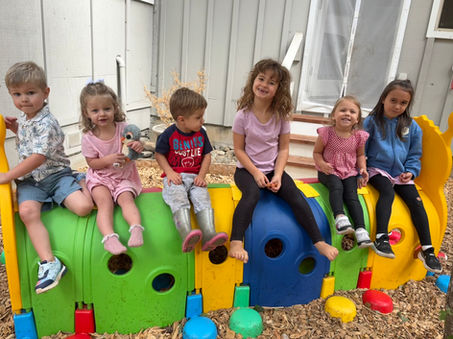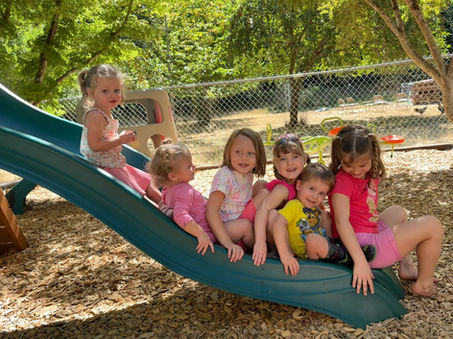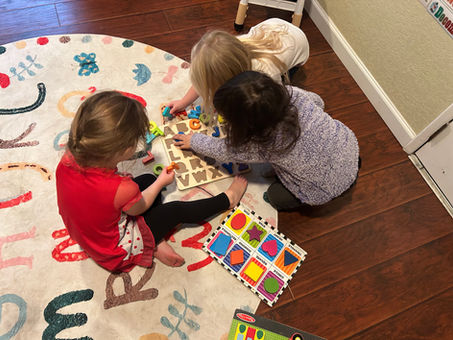
About Our Preschool!

Welcome to Azalea Gardens Preschool!
A State-Licensed, Certified Family, in-home preschool for children 2 years old and older that are pull-up trained.
I emphasize learning through play with structured classroom time at least twice a day. We also have Outside Time on the playground twice a day, weather permitting.
During classroom time, I use preschool curriculum from Experience Curriculum that covers the subjects of reading, writing, math, science, and art to prepare children for kindergarten. We do Calendar and Circle Time each morning to learn about the months of the year, days of the week, number recognition, counting, and the alphabet, as well as more educational focuses like phonics and phonemic awareness, vocabulary, reading, sorting/matching, etc.
I proudly incorporate Montessori materials and Nature-based learning activities to enrich the educational experience for all children. Learn more about my learning styles and approaches below!
I use Experience Curriculum, along with additional activities based on season/holiday/etc. To learn more about Experience Curriculum, visit their website at: https://www.mothergoosetime.com/
A FEW THINGS ABOUT ME AND MY PROGRAM:
-
I am a mom of 5! (Ages ranging from 2 years old to 16 years old)
-
I am a former teacher of Kindergarten and 2nd Grade.
-
I am CPR and First Aid Certified, as well as Food Handler Certified.
-
State Licensed, Certified Family Childcare: License # CF505060
-
ERDC Approved/Accepted: DHS Provider # HWG00016.
-
We have a large outdoor playground area with lots of equipment to play on!
-
I use a classroom setting to prepare children for classrooms at school.
-
We learn about nature all year round and do gardening in Spring.
-
I value Play-Based learning while using Experience Preschool Curriculum.
-
I use lots of education toys and games to enhance learning.
-
We explore nature and have Outdoor Time every day!
-
I follow a structured schedule, that includes nap-time.

Azalea Gardens Preschool has a 4-star rating through the
Oregon Spark program.
Spark is Oregon’s Quality Recognition and Improvement System (QRIS). Spark is a voluntary program that helps providers strengthen their practices, build on what’s working, and celebrate their progress.
As noted on the certificate, Azalea Gardens Preschool exceeds in essential standards that support quality early learning for all children.
To learn more about Spark, visit their website at https://oregonspark.org/

Learning Styles and Approaches
At Azalea Gardens Preschool, I embrace a variety of learning styles to ensure that all children have the opportunity to learn and grow! I foster a love for learning in every child by using approaches inspired by Play-Based Learning, Montessori Learning, and Nature-Based Learning.
What is Play-Based Learning?
Play-Based Learning is an educational approach where children learn through playing, emphasizing hands-on experiences, exploration, and creativity to promote learning. Play-Based Learning has shown to improve problem-solving skills, critical thinking, cooperation, communication, and conflict resolution, as well as gross and fine motor skills.
Examples: I allow several blocks of time for free play each day. We also have dress-up clothes and puppets for role-playing, a pretend kitchen and food, doll houses, toy tools and a workbench for building and repairing, educational toys, books, etc.
What is Montessori Learning?
Montessori Learning is an educational approach that emphasizes hands-on learning and self-directed exploration. This approach focuses on the whole child and their social, emotional, intellectual, and physical development. With Montessori learning, children work at their own pace manipulating concrete materials, fostering independence and self-motivation while engaging their senses and promoting deeper understanding. Montessori Learning also targets social interaction and peer learning by encouraging children to work together in partners or teams to build, create, and problem-solve with one another.
Examples: I offer an abundance of hands-on materials and incorporate them into our lessons to promote learning. Concrete materials include building blocks, wood shapes, food (like Goldfish crackers), letter blocks, etc. We also use sensory materials like play-doh, sand or dirt, water tables, etc.
What is Nature-Based Learning?
Nature-Based Learning is an educational approach that uses nature, indoors and outdoors, to promote learning and connection with the natural world. This approach involves providing opportunities for exploration in natural environments and using hands-on materials like leaves, rocks, pine cones, flowers, etc. Nature-Based Learning has shown to improve children's physical health and well-being, enhance cognitive development, and develop a greater respect for the environment.
Examples: We take nature walks and explore our surroundings, we do scavenger hunts based on our current lessons, we create art with natural materials, and we offer plenty of unstructured outdoor play!








